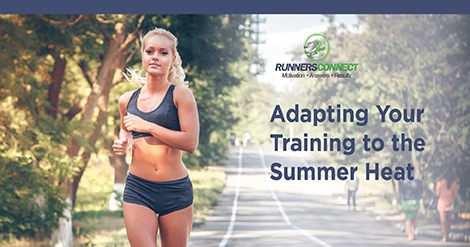While it’s true running in the winter presents some serious motivational and training challenges thanks to short days, cold weather, and icy roads, it’s actually the summer season that negatively impacts training the most.
Sure, bright sunshine and beautiful scenery make it much easier to get out the door, but the truth is, heat, humidity, vacation, and a lack of sleep all wreak havoc on your training plan, especially if you are a masters runner.
Since summer is one of the most popular and important training seasons, especially if you’re racing a fall marathon, it’s critical you approach the summer with realistic expectations about your performance and understand the potential pitfalls.
In this article, we’ll look at the two most common summer training mistakes and how you can avoid making them this year.

1. Not adjusting workout and race times for the temperature
Here’s the deal:
You will train and race slower in hot weather. This is a physiological fact and it’s critical to keep in mind when planning your workouts and evaluating performances.
Your normal body temperature is 98.6 degrees Fahrenheit. Exercising, even in cold temperatures, naturally raises the core body temperature. At first, this rise in temperature aids performance by increasing blood flow to the working muscles, hence the importance of warming-up before hard workouts and races.
However, once your internal body temperature gets above 102 degrees, you start to experience a significant drop in performance.
At 102 degrees, your body can no longer effectively cool itself and your body begins to divert blood to the skin to help keep it cool. This decreases the amount of blood available to carry oxygen to your working muscles. As a result your ability to run fast is diminished considerably.
This is also why it is not a good idea to run if you have a fever!
Therefore, you need to be realistic about your race performances and ability to hit workout splits when running in the heat. Many of the runners I consult with get very frustrated when they aren’t able to hit their goal times or when workouts feel harder than they should in the summer.
Remember this though:
It’s impossible to avoid and has nothing to do with a lack of fitness. It’s simply a physiological reality.
How to combat
RunnersConnect Bonus
Download your FREE Temperature Calculator now.
It will help estimate how much your times will be impacted by hot weather. Find out exactly how much to adjust your summer workout and race paces.
2. Not enough recovery
Getting in enough recovery during the summer months is also a huge challenge for many runners and often results in poor performance and overtraining. I’ve found this recovery deficiency to be a result of a lack of sleep, more activity outside of running, and from fatigue build-up as the body redirects resources from recovery to keeping itself cool.
Lack of sleep
To beat the heat, most runners have to hit the streets before the sun comes up. Unfortunately, in the summer this can often mean starting workouts at 5:30am or earlier. Typically, this earlier wake-up time isn’t offset by earlier bed times. In fact, most runners probably go to bed later in the summer as they enjoy the opportunity to take advantage of the weather.
Moreover, it’s difficult to catch-up on sleep during the weekends since you still have to get up and out the door early. In the winter, runners can make-up for early weekday mornings by sleeping in and enjoying more pleasant running weather later in the day.
Unfortunately:
If you’re not out the door by 6 or 7am in the summer, you’re in for a miserable run. As a result, you never have a chance to catch-up.
Travel and fun stuff
The summer is a time for family hikes, trips to the beach and a host of other activities that make the season so enjoyable. However, as I covered in my article a few weeks ago, training does not occur in a vacuum. Being active all day or soaking up the sun at the beach will impact your run the next day.
While I am not suggesting you avoid having fun this summer, factor in your activities to your workout expectations.
If you spent Saturday at the beach or on a great hike, don’t expect to have a great long run Sunday. Manage and adjust your performance expectations.
Fatigue backup
Recovery between workouts is slowed during the summer months.
Now:
Unless you happen to spend your entire day in an air conditioned building (and unfortunately, some us may actually do this), your body is going to use resources it would normally use for recovery on keeping itself cool.
As discussed previously, your body will divert blood to the skin to facilitate cooling rather than pumping your muscles full of oxygen and nutrient-rich blood. As a result, recovery is slowed.
Think of this process like a traffic jam. All it takes is a small bottleneck or one lane closing to backup traffic on the highway for miles. With recovery, all it takes is a slight reduction to back up the recovery process for days.
Therefore, in the summer, running the same number of miles per week is going to feel harder than it does in the spring and fall when the weather is perfect.
How to combat
My advice is to schedule the occasional down week or build in an additional recovery day during your weekly training. This can help you catch up on sleep, allow you to enjoy a consequence-free hike or day at the beach, and can help avoid overtraining and getting frustrated with what appears to be a lack of progress.
As you prepare to tackle your summer training this year, keep these factors and physiological principles of running in the heat in mind to avoid frustration and potential overtraining.



